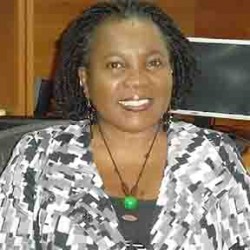By Pushpa Balgobin
in Paramaribo, Suriname
Four years after the Caricom trade council initiated a committee to begin implementation of comprehensive Sanitary and Phytosanitary (SPS) measures (which ensure plant health and safety for export) Guyana is slated to be one of the countries responsible for moving the process along.
Inter-American Institute for Cooperation on Agriculture (IICA) Agriculture Health and Food Safety Specialist Carol Thomas told Stabroek News that market access has been flawed for many years because of a lack of science-based data. She said that “a lot of time we cannot access the market because we don’t have the proper systems in place to meet the requirements that have been established.”
Thomas said that to meet international requirements the Caribbean region needed to speed up and

take more responsibility; she acknowledged that the process was discussed over four years ago and while work has been ongoing more is needed. She said Guyana’s laboratories had expertise in pesticide residue and for that reason labs in Guyana were being looked at to perform various tests.
The IICA’s regional specialist stated that Guyana would be part of a larger network that would allow the region to gain access to the European and American markets on a larger scale by complying and laying the foundation for international accreditation.
She touched on the fact that the Caribbean is currently dealing with problems over interregional trade due to the misuse of SPS practices. She said this was the result of political clout as well as a lack of understanding. She did not deny that there have been many instances where countries used the SPS framework to prevent importation of goods based on the need to preserve a local market.
Thomas did not disclose any specific instances in which the issue had caused tension, but did say that the Caricom Council for Trade and Economic Development (COTED) had to raise the issue on multiple occasions even at last year’s Caribbean Week of Agriculture (CWA) and that it would be discussed further during this year’s CWA currently underway in Suriname.
She stated that many times a mixture of ignorance and misuse of policy drives the political mindset that results in the advice of technical persons being largely ignored. Thomas said political resolve was needed to make a comprehensive change, but that through continued dialogue the situation on the ground was getting better.
She acknowledged that because of countries like Guyana that are capable of large-scale agriculture involving a variety of crops, rules needed to be regionally agreed to. Thomas said Caricom should not get into any situation where one nation is overwhelming the others.
She said SPS regulations would improve regional trade and that was needed although it seemed contradictory with many individual countries focusing on frameworks built on ‘grow more food’ and ‘eat what is locally produced’. The agriculture specialist stated that a basket approach needed to be identified to ensure that countries focus on areas that were the most lucrative.
And although Guyana has the capacity for large-scale multifaceted agriculture production, Thomas said, that did not mean that the country needed to stretch itself too thin.
Moving forward, Thomas said, the region had to look outside itself and this was an area where Guyana could lead the pack, considering the country’s agriculture capabilities on the large scale.
Meanwhile, during her presentation on SPS implications for trade and economic development, she called for honest enforcement of current legislation while proposing that reform in local and regional laws had to be identified.
Head of the Caribbean Agriculture Research and Development Institute Dr Arlington Chesney stated that the legal framework had to be put in place so compliance was possible.
Coordinator of the Food and Agriculture Organisation’s Sub-regional Office for the Caribbean Dr John Deep Ford concurred, noting that a message had to be sent to the regional institutions that Caricom had the final responsibility to feasibly find the framework that worked for comprehensive implementation of the SPS measures.
Meantime, Desiree Field-Ridley, Officer in Charge of Trade and Economic Integration for Caricom had also stated that misuse of SPS regulations was detrimental to regional trade cohesion.
Caribbean Week of Agriculture is being held in Suriname and the opening session was hosted at the Paramaribo Chamber of Commerce on Monday.








